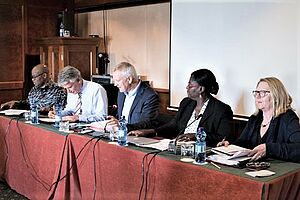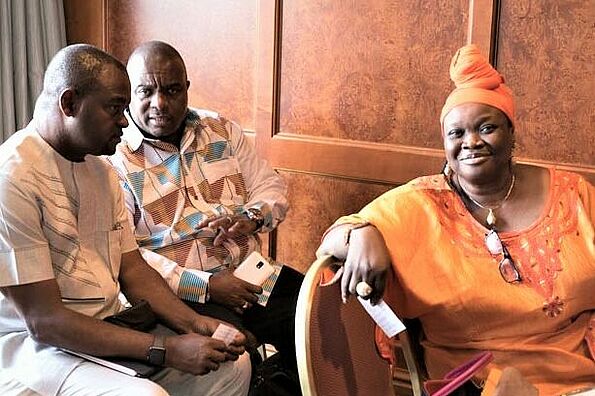Africa-Europe dialogue important more than ever

Every three years, the leaders of the European Union (EU) and African Union (AU) along with the heads of state and other high-ranking politicians from their member states gather to discuss the future of their partnership. The up-coming Africa-EU summit in November faces serious challenges though.
Since the last summit in 2014, the global landscape has—again—changed significantly, posing new challenges to the partnership. By respectfully working together, the cooperation holds great potential to resolve these challenges. This holds especially true in the area of global governance issues where both partners have similar interests. However, in order to achieve that, Africa and Europe have to sort out issues that still stand in the way of a strengthened and mutually beneficial partnership. First and foremost, Europe mustn’t only push its own interests and agenda, but needs to listen to its partner more and factor in African interests. The intercontinental dialog is therefore more relevant than ever.
Friedrich-Ebert-Stiftung (FES) and CCPAU organized a two-day pre-Summit meeting and are now preparing a report to contribute to a forward looking agenda for the Summit. Among the participants at the meeting was Adebayo Olukoshi, Director of the Regional Office for Africa and West Asia with International IDEA in Addis Ababa, and Distinguished Visiting Professor at the University of Johannesburg, South Africa.
In this interview, Prof. Olukoshi shares his views about the future of Africa-EU relations and the importance of dealing with the deep-rooted imbalance between the continents, consequence of a long colonial history that persists under the current global economic and governance order.
How would you characterize the relationship between Africa and the EU?
Africa and Europe have had a long, though mostly lopsided history of relations that have been carried over and refracted into the configuration of the more contemporary ties between the EU and the African continent. In practice, a deep-rooted imbalance in the EU’s engagements with Africa has persisted as a broad carry-over from a history of exploitation and domination that became the essential feature of Africa-Europe relations over the last five to six hundred years.
"It is this same framework that justified colonialism in the first place; adjusted for changing times and values, it is the same framework that underpins the structural dependency that has stymied Africa’s capacity"
The contemporary Africa-EU relationship is summed up in a peculiar metaphor of “partnership” which, when unpacked, translates into frames of engagement in which, by definition, Africa has the monopoly of the problems and Europe the monopoly of the answers. It is this same framework that justified colonialism in the first place; adjusted for changing times and values, it is the same framework that underpins the structural dependency that has stymied Africa’s capacity to translate its vast potential into transformative progress.
What is missing in the relationship between Africa and the EU, and what would you tell African and European leaders to make the partnership more successful?
There is still at root a refusal to face up to the multifaceted legacies of the difficult history of relations between Africa and Europe and, having done that, to draw appropriate lessons for a more balanced, workable, and durable partnership. In the absence of the kinds of atonement that are capable of propelling political and policy attitudes in Europe towards a deeper sense of humility (as opposed to a false and haughty altruism behind which raw self-interests are disguised) and an active search for a solid basis for genuine mutuality, it is hard to see how engagements will not remain a continuation of business as usual. Africa and Europe need each other but this mutuality is also in urgent need of redefinition so that it is not played out at the expense of one of the parties.
What is the EU’s comparative advantage vis-à-vis other strategic partners of Africa such as China, India, South Korea, Turkey etc.?
With the appropriate frame of mind, Europe ordinarily ought to be able to take advantage of its relative geographical proximity to Africa to build solid bridges and remove self-defeating walls. However, repeatedly over time, especially since the period after the Second World War when the drive towards independence became unstoppable, Europe has essentially invested itself in development cooperation approaches that have failed repeatedly, and despite being routinely tweaked, to deliver the structural socio-economic transformation that would enable Africa to break out of underdevelopment.
"Europe’s leadership was once unassailable [but this] is also shifting radically as its aggregate significance declines in the face of rising levels of domestic revenue mobilization across Africa"
Technological advancements are increasingly bridging geographical distances and inexorably making the world into a global village. The context of development cooperation where Europe’s leadership was once unassailable is also shifting radically as its aggregate significance declines in the face of rising levels of domestic revenue mobilization across Africa, the expansion of diaspora inflows, and the emergence of additional sources of foreign investments, grants, and development finance. Something significantly new is needed if the EU is to be able to claim and hold on to any special advantages in its relations with Africa.
What are the biggest challenges for the two continents in the next couple of years and how could the partners tackle them together?
Before the spread of awareness about the challenges posed by global climate change and the onset of the ongoing crisis around the flow of migrants, there were already ample signs of dislocation and dysfunction in the global economic and governance order. These problems presented themselves by way, for example, of growing unemployment and inequality, and the challenges posed to national economic health by international tax havens. Arguably, the fact that these problems were allowed to fester became, at the very least, part of the trigger for the violent extremism and broad-ranging criminality wracking parts of Africa and Europe. The migratory pressures from Africa to Europe cannot also be dissociated from these problems. The challenges speak, in part, to the need for a radical recalibration of development thinking and action in ways that can ensure that globally and locally, economic policy once again serves broad human civilizational goals.
What do you expect from the upcoming Africa-EU summit in Abidjan in November 2017 and how would a successful summit look like to you?
On the face of things, the conditions are not exactly right for a summit that will deliver outstanding outcomes: Europe is grappling with its Great Recession and the toll it has taken and is still taking; the disconnect between the public institutions and citizens has never been deeper in living memory; populism, especially of the right, is severely disrupting domestic politics in many European countries and also weakening the transatlantic relationship with the United States; the Brexit vote and its unfolding repercussions; and new security threats at home and abroad that have put fear of the future in the populace. These difficulties have rubbed off adversely on the EU itself as an institution not just in terms of diminished trust in it at home but also with regard to challenges to its authority by an admixture of members, big and small.
"We need a shift in paradigm away from the patronizing approach that has endured for too long [...]. African leaders too can do their part in this paradigm shift [...]"
Beyond the pessimism that the recent and existing face value of things may create, however, it is still possible to convert the challenges which Europe is confronted with into opportunities for a wholesale resetting of Africa-Europe relations. Such an outcome will call for nothing less than a shift in paradigm away from the patronizing approach that has endured for too long and to which many are accustomed without even noticing.
African leaders too can do their part in this paradigm shift by moving decisively away from a dependency mentality by which they assume that the EU has the solutions, or a semblance of them, to their problems. ###
For more information about the work by Friedrich-Ebert-Stiftung (FES) on the Africa-EU dialogue, contact Florian Koch, Director of the FES African Union Cooperation project in Addis Ababa info(at)fes-au.org.






